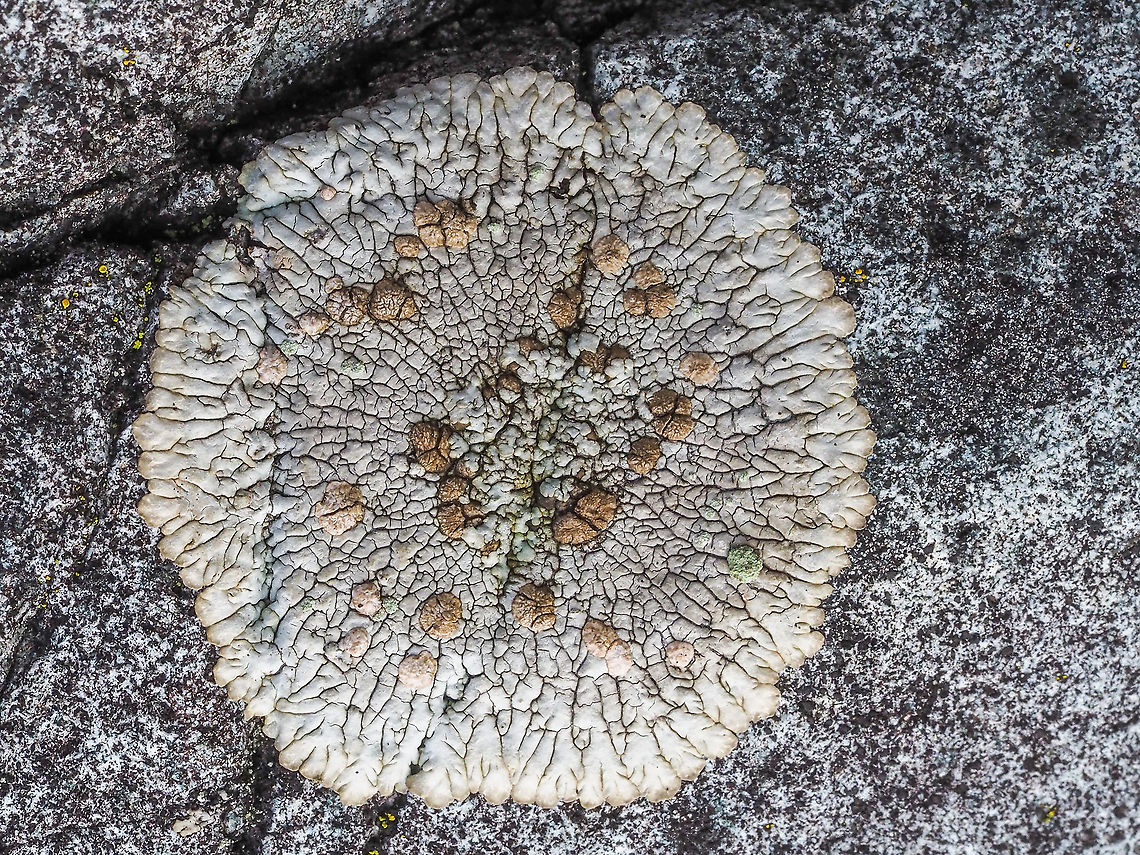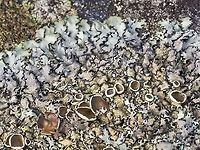 Promoted
Promoted
An Example of Xanthoparmelia cumberlandia?
Shingled Rock Shield Lichen, Questionable Rock Frog Lichen, Cumberland Rock Shield Lichen, Xanthoparmelia cumberlandia... take your pick. I am going out on a limb on this one.
E-Flora BC Atlas says, “ Xanthoparmelia is taxonomically the most difficult of the genera previously united within Parmelia. Reliable identification of many species depends on a knowledge of the chemical substances they contain. Though this is most reliably attained through use of thin-layer chromatography, the chemistry of the B.C. Species can usually be surmised from the medullary reaction with K.”
This example is a smaller, 4cm in diameter, and younger one compared to older specimens.

No species identified
The species on this photo is not identified yet. When signed in, you can identify species on photos that you uploaded. If you have earned the social image editing capability, you can also identify species on photos uploaded by others.

comments (11)
To me, there is no doubt in my mind that the ID is correct, but I can't "proof" it 100%, so I decided to identify it as such and express the situation in the naming and description. I have no problem with leaving identifications open if there is too much doubt, such as when there are two or more somewhat likely candidates. Scientific correctness in identification is _always_ a sliding scale subject to interpretation, unless you have the type specimen on photo, so it's hard to draw a clear cut line.
Both methods have their pros and cons. In the end it's the responsibility of the person applying the ID and we do document that here, same as in a museum collection where I should also always be able to see who identified a specimen (and when), so any later observer can decide for her/himself to "blindly" trust the ID or not.
My 2 cents. Arp Posted 5 years ago
I wonder how interesting it would be to be included in a discussion with lichenologists, if that is what they are called, when they are classifying and naming a species? I can imagine it’s hard enough when you are dealing with one organism but when you have a combination of three or more entities manifesting as one it must be even more difficult. As I mentioned, how interesting? Posted 5 years ago
Arp, thank you very much for your help. I understand your point and completely agree with you. Posted 5 years ago
Gary, what you describe is perfectly normal and pretty much the idea of JungleDragon: there is a low barrier to enter, as all it takes to start is a photo. Yet, next we try to turn it into an observation with species information included.
The best we can. As most of us (myself included) are not zoologists or have a background in biology. So don't worry about being "just a photographer". That applies to most of us, we're all in this same boat.
IDs can definitely be difficult for specific categories (fungi/lichen, arthropods) yet if you keep trying and learn to use other resources, you'll get better at it over time. Which is good for JD but also for any individual's growth. I've learned a tremendous amount here. By the way, I think you're very competent at IDs in general, it's just that some categories like lichen are impossibly hard.
Don't be put off by corrections. My earlier postings (2012, 2013, etc) of fungi probably had 50% wrongly identified by myself. I'm very happy that others corrected those. It shows that they care and invested time in it, also it's a learning. As long as it's done respectfully, I celebrate this process and culture.
If somebody has better data or logic to come to an ID, let's welcome it, is how I see it.
As for this case, I frankly have no idea what is correct. But as for some guidance, if it's like a 50% chance, it's best not to identify as then we're just guessing. If you're like > 90% sure and there's only one other candidate which is far less likely, you can consider identifying the species. Sometimes we call that a "tentative ID", and place that remark in the description.
Anyway, just wanted to comfort you to not feel too intimidated by it all, we all share this feeling :) Posted 5 years ago, modified 5 years ago
To me it is great to have this discussion. I have to admit to being slightly put off when my “ignorance” has been noticed. I am also quick to realize that all corrections are done in a very supportive way. Many thanks to you both.
Gary Posted 5 years ago